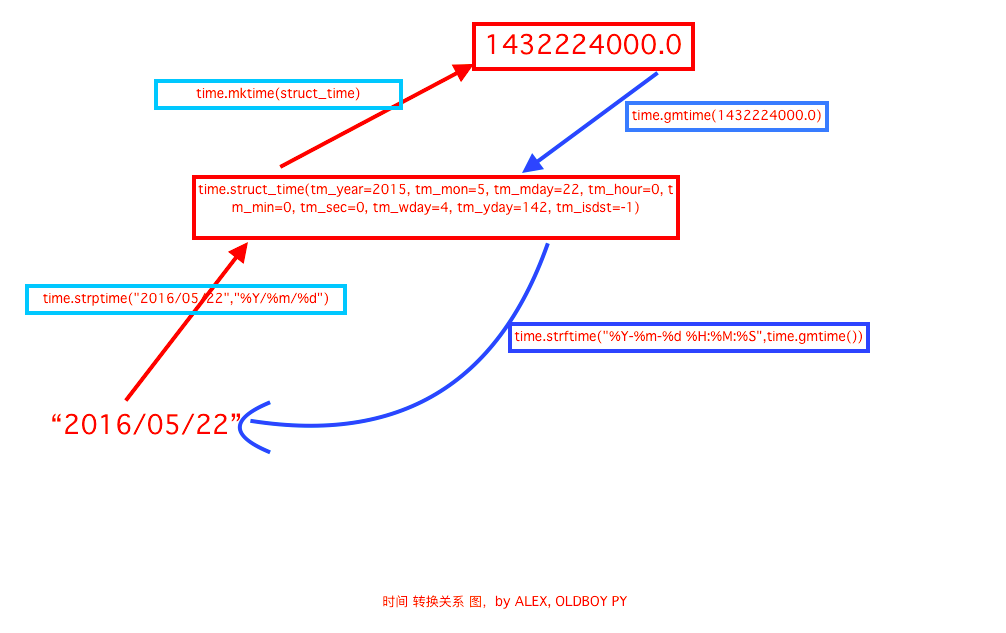模块是封装一段代码来实现某种功能。
分为三类:
1.自定义模块
2.标准库,内置模块
3.开源模块
-----------------------------------------------------------------------------------------------------
1.time模块

1 >>> import time 2 #返回处理器时间,3.3后变成了time.process_time()测量处理器运算时间,不包括sleep时间,不稳定 3 >>> print(time.clock()) 4 2.9933526190766363e-06 5 >>> print(time.process_time()) 6 0.09360059999999999 7 8 #返回与utc时间的时间差,以秒计算 9 >>> print(time.altzone) 10 -32400 11 #本地时间 12 >>> print(time.localtime()) 13 time.struct_time(tm_year=2017, tm_mon=5, tm_mday=21, tm_hour=20, tm_min=54, tm_s 14 ec=47, tm_wday=6, tm_yday=141, tm_isdst=0) 15 #返回utc时间的struc时间对象格式 16 >>> print(time.gmtime(time.time()-800000)) 17 time.struct_time(tm_year=2017, tm_mon=5, tm_mday=12, tm_hour=6, tm_min=41, tm_se 18 c=56, tm_wday=4, tm_yday=132, tm_isdst=0) 19 #返回时间格式 20 >>> print(time.asctime()) 21 Sun May 21 20:56:26 2017 22 >>> print(time.asctime(time.localtime())) 23 Sun May 21 20:55:55 2017
日期字符串转换为时间戳

1 #将字符串转换成struct对象 2 >>> string_2_struct = time.strptime("2016/05/22","%Y/%m/%d") 3 >>> print(string_2_struct) 4 time.struct_time(tm_year=2016, tm_mon=5, tm_mday=22, tm_hour=0, tm_min=0, tm_sec 5 =0, tm_wday=6, tm_yday=143, tm_isdst=-1) 6 >>> 7 #将struct对象转换为时间戳对象 8 >>> string_2_stamp = time.mktime(string_2_struct) 9 >>> print(string_2_stamp) 10 1463846400.0
时间戳转换为字符串
1 >>> print(time.time()) #当前utc时间,时间是秒 2 1495372102.3229373 3 >>> print(time.gmtime()) #struct对象的时间格式 4 time.struct_time(tm_year=2017, tm_mon=5, tm_mday=21, tm_hour=13, tm_min=8, tm_se 5 c=29, tm_wday=6, tm_yday=141, tm_isdst=0) 6 7 #将utc时间戳转换成struct_time格式 8 >>> print(time.gmtime(time.time()-86640)) 9 time.struct_time(tm_year=2017, tm_mon=5, tm_mday=20, tm_hour=13, tm_min=1, tm_se 10 c=42, tm_wday=5, tm_yday=140, tm_isdst=0) 11 #将utc struct_time格式转成指定的字符串格式 12 >>> print(time.strftime("%Y-%m-%d %H:%M:%S",time.gmtime())) 13 2017-05-21 13:07:45
时间加减

1 >>> import datetime 2 >>> print("datetime".center(50,'*')) 3 *********************datetime********************* 4 >>> print(datetime.datetime.now()) #返回当前时间 5 2017-05-21 21:12:10.507988 6 # 时间戳直接转成日期格式 2016-08-19 7 >>> print(datetime.date.fromtimestamp(time.time())) 8 2017-05-21 9 10 #返回当前时间 11 >>> print(datetime.datetime.now()) 12 2017-05-21 21:17:05.163842 13 #时间戳直接转成日期格式 2016-08-19 14 >>> print(datetime.date.fromtimestamp(time.time())) 15 2017-05-21 16 #当前时间加3天 17 >>> print(datetime.datetime.now()+datetime.timedelta(3)) 18 2017-05-24 21:17:39.092782 19 #当前时间减3天 20 >>> print(datetime.datetime.now()+datetime.timedelta(-3)) 21 2017-05-18 21:17:46.039180 22 #当前时间加3小时 23 >>> print(datetime.datetime.now()+datetime.timedelta(hours=3)) 24 2017-05-22 00:18:01.337055 25 #当前时间加30分钟 26 >>> print(datetime.datetime.now()+datetime.timedelta(minutes=30)) 27 2017-05-21 21:49:16.833373
时间替换

1 >>> c_time = datetime.datetime.now() 2 >>> print(c_time.replace(minute=3,hour=2)) 3 2017-05-21 02:03:05.940477 4 >>> print(datetime.datetime.now) 5 <built-in method now of type object at 0x0000000067D262C0> 6 >>> print(datetime.datetime.now()) 7 2017-05-21 21:23:49.137948
| Directive | Meaning | Notes |
|---|---|---|
%a |
Locale’s abbreviated weekday name. | |
%A |
Locale’s full weekday name. | |
%b |
Locale’s abbreviated month name. | |
%B |
Locale’s full month name. | |
%c |
Locale’s appropriate date and time representation. | |
%d |
Day of the month as a decimal number [01,31]. | |
%H |
Hour (24-hour clock) as a decimal number [00,23]. | |
%I |
Hour (12-hour clock) as a decimal number [01,12]. | |
%j |
Day of the year as a decimal number [001,366]. | |
%m |
Month as a decimal number [01,12]. | |
%M |
Minute as a decimal number [00,59]. | |
%p |
Locale’s equivalent of either AM or PM. | (1) |
%S |
Second as a decimal number [00,61]. | (2) |
%U |
Week number of the year (Sunday as the first day of the week) as a decimal number [00,53]. All days in a new year preceding the first Sunday are considered to be in week 0. | (3) |
%w |
Weekday as a decimal number [0(Sunday),6]. | |
%W |
Week number of the year (Monday as the first day of the week) as a decimal number [00,53]. All days in a new year preceding the first Monday are considered to be in week 0. | (3) |
%x |
Locale’s appropriate date representation. | |
%X |
Locale’s appropriate time representation. | |
%y |
Year without century as a decimal number [00,99]. | |
%Y |
Year with century as a decimal number. | |
%z |
Time zone offset indicating a positive or negative time difference from UTC/GMT of the form +HHMM or -HHMM, where H represents decimal hour digits and M represents decimal minute digits [-23:59, +23:59]. | |
%Z |
Time zone name (no characters if no time zone exists). | |
%% |
A literal '%' character. |
字符串、时间格式、utc时间的转换关系

a.字符串转换为utc时间
>>> time.strptime("2016/05/22","%Y/%m/%d")
time.struct_time(tm_year=2016, tm_mon=5, tm_mday=22, tm_hour=0, tm_min=0, tm_sec=0, tm_wday=6, tm_yday=143, tm_isdst=-1)
>>> struct_time = time.strptime("2016/05/22","%Y/%m/%d")
>>> time.mktime(struct_time)
1463846400.0
b.utc时间转换为字符串
>>> time.gmtime(1463846400.0)
time.struct_time(tm_year=2016, tm_mon=5, tm_mday=21, tm_hour=16, tm_min=0, tm_se
c=0, tm_wday=5, tm_yday=142, tm_isdst=0)
>>> time.strftime("%Y-%m-%d %H:%M:%S",time.gmtime())
'2017-05-21 13:30:47'
